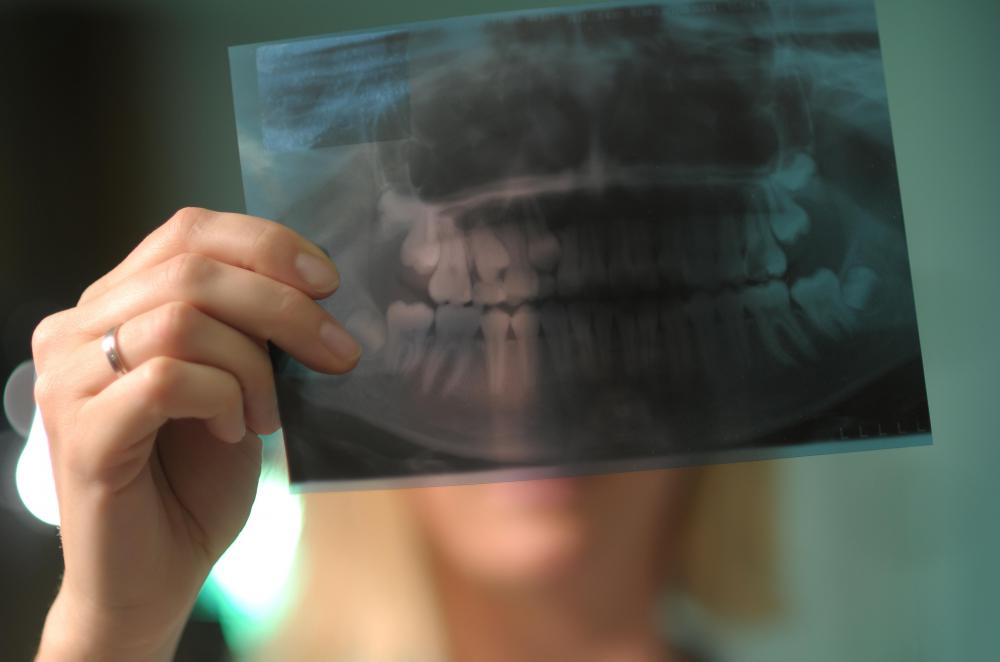At WiseGEEK, we're committed to delivering accurate, trustworthy information. Our expert-authored content is rigorously fact-checked and sourced from credible authorities. Discover how we uphold the highest standards in providing you with reliable knowledge.
What is Radiation Poisoning?
Radiation poisoning is the common name for what the US Center for Disease Control classifies as Acute Radiation Syndrome (ARS). The condition is caused by excessive exposure to ionized radiation, which can permanently affect the cells in the body. Most people are not exposed to sufficient levels of radiation in daily life to cause ARS, but those who work with radioactive materials or who are subject to a single high dose of radiation have a higher risk level of acquiring radiation poisoning.
Scientists conducting early experiments with radioactive materials in the late 19th century discovered radiation poisoning. Nikolai Tesla, a famous inventor and scientist, described burns he received after exposing his hands to early X-ray technology. Famed female scientist Marie Curie devoted her life to understanding radiation and its uses, and died of cancer believed to be caused by consistent exposure to radiation.

Although the dangers of working with radioactive materials were clear by the 1940s, the world was not exposed to the true destructive possibilities of ARS until the nuclear bombing of Hiroshima and Nagasaki in 1945. Some experts suggest that radiation poisoning accounts for nearly 20% of all people killed in the wake of the bombings. Continuing studies in the decades since has showed a jump in cancers and other associated diseases attributed to radiation exposure.

Typical symptoms of radiation poisoning begin with severe nausea and vomiting. If a person is exposed to a single, high dose of radiation, these symptoms can begin within hours. Fever and fatigue typically appear next, followed by possible hair loss, diarrhea or blood in the stool and urine, dizziness, and a drop in blood pressure. In cases of a severe exposure, death occurs in about half of all cases.

People exposed to low doses of radiation over a long period of time, such as biochemical workers, may be more likely to develop other illnesses caused by chronic radiation sickness. Often, those suffering chronic exposure will have a significantly higher risk of cancers and tumors. Radiation sickness damages the cells, tissues, and organs, as well as the immune system, so the whole body is at risk for possible future disease.

Unfortunately, treatments do not yet exist that can cure radiation sickness. Although some drugs are currently in government tests to fight the effects, the current treatment is simply easing the pain of victims and trying to prevent infection or additional problems. It is possible to recover from radiation sickness, but the likelihood of survival depends on exposure level and personal health, and carries no guarantee of safety from developing radiation-associated cancers due to the cellular damage.
AS FEATURED ON:
AS FEATURED ON:




















Discussion Comments
the article is very informative and constructive. At least we gain the basic understanding what is the ARS all about. Thanks.-- Dr. Ching
a question: I was treated with radiation in 1976 for hokins lymphoma along with chemo (Vietman Agent Orange) The treatments where to my pelvic area. Years later I have been having serious issues with diverticulosis. A resection has been recommended. Could this radiation contribute to my current issues?
@ Glasshouse & ValleyFiah- One of the first treatments for radiation exposure is to decontaminate the body as much as possible. Completely stripping down and washing the hair and body with soap and water will decontaminate the victim of most external radiation. Just be sure to scrub lightly so as not to push the radioactive particles into the skins pores.
The sooner a victim can get the radioactive particles from the body, the less likely that person is to suffer from acute radiation poisoning. Immediate decontamination can prevent a victim from inhaling gamma and beta particles that otherwise may not penetrate the skin.
The patient should also seek a doctor to administer the drugs you two spoke discussed. The sooner doctors administer these drugs the more effective they are. The premise of these drugs is to bind and block radiation so time is of the essence.
@ ValleyFiah- Doctors can administer two other drugs to victims of radiation poisoning in addition, or substitution, to Prussian blue.
Doctors use potassium iodide in situations where radioactive iodine poisoning occurs. Iodine usually heads for the thyroid glands when it enters the body because this is where iodine is used.
Potassium iodide can block radioiodine because the potassium iodide will fulfill any iodine deficiencies in the body, making the body expel the radioiodine. The kidneys eventually process radioiodine, passing it through the body in urine.
Diethylenetriamine Pentaacidic Acid (DTPA) absorbs isotopes that Prussian blue cannot. DTPA absorbs radioactive heavy metals like plutonium, curium (named after Marie Curie), and americium. These metals are bound to the DTPA, which the kidneys then process, eventually passing the radioactive waste through the body as urine.
While there is no cure for radiation poisoning there are treatments to prevent radiation poisoning from progressing.
Prussian blue is a dye that can bind with certain radioactive materials like cesium and thallium. If you suspect that you are suffering from radiation poisoning due to inhalation or ingestion, then a doctor may administer doses of Prussian blue to prevent absorption by body tissue. The dye will bind with radioactive material and pass through the intestinal tract.
Prussian blue is safe for everyone from the ages two and up (including pregnant women). Dose sizes are not established for children under two, but Prussian blue is assumed safe.
The CDC keeps Prussian blue as part of the Strategic National Stockpile (SNS) in case of a national emergency.
Post your comments